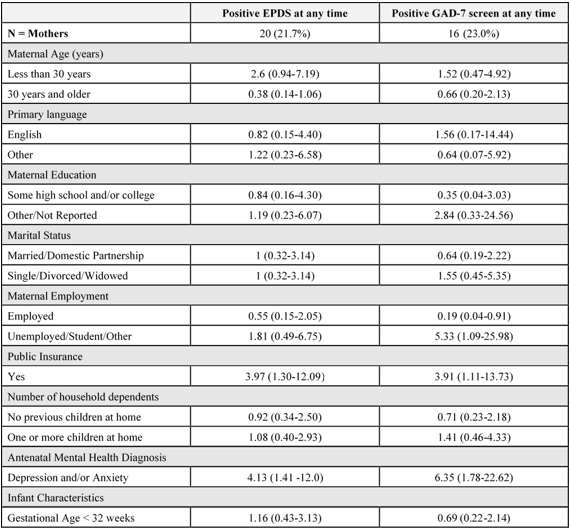Neonatal-Perinatal Health Care Delivery: Practices and Procedures
Neonatal-Perinatal Health Care Delivery 1: Practices: Antenatal Consultation, Substance Use, Potpourri
729 - Screening Compliance, Incidence, and Risk Factors for Perinatal Mood and Anxiety Disorder in the Neonatal Intensive Care Unit: A Single Unit Experience
Publication Number: 729.244

Cailin F. White, MHIHIM (she/her/hers)
Research Coordinator
University of Washington School of Medicine
Seattle, Washington, United States
Presenting Author(s)
Background: Parents of newborns admitted to the neonatal intensive care unit (NICU) are at increased risk for perinatal mood and anxiety disorders (PMAD), including perinatal depression, perinatal anxiety, and postpartum psychosis. However, these parents often miss opportunities for PMAD screening during their infants’ hospitalization that would otherwise occur at routine ambulatory pediatric visits.
Objective: This study aims to assess the compliance with routine screening for PMAD, prevalence of PMAD, and associated maternal and infant risk factors in a single unit to inform ongoing quality improvement efforts.
Design/Methods: This is a retrospective cohort study of infants admitted to the NICU for at least 10 days in an academic Level IV NICU in the Pacific Northwest from January 1, 2021 to December 31, 2021. Validated screenings for postpartum depression (Edinburgh Postpartum Depression Scale, EPDS) and anxiety (Generalized Anxiety Disorder, GAD-7) were distributed to birth parents when their infant reached at least 10 days of age. Data from these screens as well as demographics data were collected, deidentified, and input into a data collection tool for analysis.
Results:
72 of 215 (34%) eligible birth parents completed screening for postpartum depression at 10-14 days postpartum. Having a preferred language of English was associated with a much higher odds of completing screening (2.19 OR). County of residence was associated with a 27% reduction (0.73 OR) in rates of screening among those who lived in-county, when compared to those living outside of the county where the facility was located. Of the 81 who completed the EPDS screening at 10-14 days postpartum, 18 (22%) screened positive for postpartum depression, and of the 69 who completed the GAD-7 at this time, 16 (23%) screened positive for anxiety. Antenatal history of mental health diagnoses was associated with a 23% increase in positive score on screening, and gestational age < 32 weeks was associated with a 16% increase in risk of having a positive depression screen (Table 1). Of the 63 parents of infants whose hospital stay exceeded 6 weeks, 11 (17%) completed repeat EPDS screening. Of those, 2 (18%) screened positive for depression.
Conclusion(s): Mechanisms to ensure routine screening remains challenging, particularly in families of infants with prolonged NICU stays. Anxiety may be an underappreciated presentation of PMAD in the NICU. Ongoing efforts to support parents in the NICU are needed with further focus on repeated screens during prolonged NICU stays.
